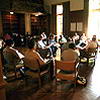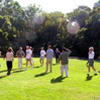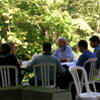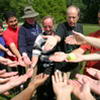PROGRAM
Pattern Languages of Programs (PLoP™) conference is a premier event for pattern authors and pattern enthusiasts to gather, discuss and learn more about patterns and software development.
The conference program is almost complete, so only a few of this page may be further updated.
- conference at a glance;
- invited talks: Richard Gabriel, Linda Rising, Ralph Johnson;
- accepted papers: for Writers' Workshops, for the Writing Group, and for Presentations;
- day-by-day: Wednesday, Thursday, Friday, and Saturday
The conference schedule is available below and soon it will be available also as a printable document.
We invite all participants to get ready for the conference!
Conference at a Glance
The BootCamp, a special full-day Pre-PLoP activity for newcomers, will happen on Wednesday, 5th September, 8h30-17h00.
The PLoP conference starts on Wednesday evening, September 5th, at 18h00, with the traditional Papa Dell's Pizza welcome reception, and it will conclude on Saturday afternoon, September 8th.
Invited Talks
| Are Agilists the Bonobos of Software Development? | |
 |
|
|
The chimpanzees and the bonobos are the animals whose genetic make-up is closest to that of human beings, but their ""cultures"" (and, yes, these animals definitely have well-defined cultures) are very different. The chimpanzees are aggressive, and operate in a strict, alpha-male-dominated hierarchy, while the bonobos are gentle and promiscuous! What sort of tie-could this have for those of us who favor agile development over plan-driven? Linda Rising has a Ph.D. from Arizona State University in the field of object-based design metrics and a background that includes university teaching and industry work in telecommunications, avionics, and strategic weapons systems. An internationally known presenter on topics related to patterns, retrospectives, agile development approaches, and the change process, Linda is the author of numerous articles and four books---Design Patterns in Communications, The Pattern Almanac 2000, A Patterns Handbook, and Fearless Change: Patterns for Introducing New Ideas, written with Mary Lynn Manns. Find more information about Linda at www.lindarising.org. |
|
Accepted Papers
All accepted papers were organized by different categories, based on their type (pattern paper vs regular paper), its potential usefulness, and its level of maturity, and assigned to different sessions: Writers' Workshops, Writing Group, or Presentation.
To increase feedback, all papers are part of a Writers' Workshop. Papers of the Writing Group will be selected to be workshoped depending on their evolution during the conference.
Day-by-Day
| Thursday, September 6 | |
| 07:30-09:00 | Breakfast |
| 09:00-09:30 | Opening |
| 09:30-10:00 | |
| 10:00-10:30 |  Writers' Workshop Demonstration Writers' Workshop DemonstrationA mock Writers' Workshop demonstrates how the main activity of PLoP is run. A pattern is previously selected to be discussed during this demonstration. During the workshop, a narrator will explain and point its most important parts and happenings. The paper chosen is A Pattern of Their Own", by Mary Lynn Manns. |
| 10:30-11:00 | Coffee Break |
| 11:00-11:15 |  Workshop Preparation Workshop PreparationWorkshop participants meet together with their workshop leaders to organize the several sessions of the workshop, basically to assign the papers to sessions, so that everyone can get adequately prepared for each session. This year, there are 4 groups of papers:
Each group has 4-5 papers, and includes 1 paper assigned for the Writing Group. Assignments of papers to groups are posted on the list of accepted papers. |
| 11:15-12:00 |  Reading Time, Allerton Time, Mentoring Time Reading Time, Allerton Time, Mentoring TimeFor many participants, this could be a free time period for you to do whatever you want or need. Those that haven't read all the papers, can use it to read more while knowing better Allerton house and gardens. Those with papers assigned to the Writing Group, this would be an opportunity to meet with their mentor to get feedback and work on their paper. |
| 12:00-13:00 | Lunch |
| 13:00-14:15 |  Writers' Workshop I Writers' Workshop IWriters' workshops are the primary focus of our time at PLoP and in them we discuss the accepted papers. The format of Writers' Workshops has been adopted from poetry review. Each writers' workshop contains 5 papers, which authors must read before the conference to be able to give each other feedback on their work in a peer review session of around one hour per paper. In each of the 5 sessions, the authors of the paper under discussion remain silent while the others discuss it and explain additional insights and views they have about it. Non-authors are free to choose the writers' workshop group they want, but are supposed to stay with their workshop over the entire conference, to benefit more from it. A fruitful participation in a Writers' Workshop requires to read its papers in advance and, if possible, to take some notes on what you liked about the papers and what you think needs improvement. Since there is only small periods of reading time during the Writers' Workshops and experience shows that chatting with others or meeting people is much more fun than being alone reading papers, do yourself a favor and read the papers of your Writers' Workshop in advance. |
| 14:15-14:45 | |
| 14:45-15:00 | Coffee Break |
| 15:00-16:00 |  Presentations I, II Presentations I, IIAuthors with papers accepted for Presentation will be provided a period of 30 min, including a paper presentation during no more than 20 min, followed by a period of questions and discussion of around 10 min. |
| 16:00-17:15 |  Writers' Workshops II Writers' Workshops II2nd session of the Writers' workshops. |
| 17:15-17:30 | |
| 17:30-19:00 | Dinner |
| 19:00-20:30 | |
| 20:30-22:00 | |
| Friday, September 7 | |
| 07:30-08:30 | Breakfast |
| 08:30-08:45 | |
| 08:45-09:15 | |
| 09:15-10:30 |  Writers' Workshop III Writers' Workshop III3rd session of the Writers' workshops. |
| 10:30-11:00 | Coffee Break |
| 11:00-12:00 | |
| 12:00-13:00 | Lunch |
| 13:00-14:00 |  Presentations III, IV Presentations III, IVTime to listen to two more papers accepted for Presentation (30 min = 20 min presentation + 10 min of discussion). III. "A Pattern Story for Aspect-Oriented State Machines" , by Mark Mahoney, Tzilla Elrad. |
| 14:00-14:15 | |
| 14:15-14:45 |  Presentation V Presentation VTime for another paper accepted for Presentation (30min = 20min presentation + 10 min of discussion). |
| 14:45-15:00 | Coffee Break |
| 15:00-16:00 | |
| 16:00-17:15 |  Writers' Workshops IV Writers' Workshops IV4th session of the Writers' workshops. |
| 17:15-17:30 | |
| 17:30-19:00 | Dinner |
| 19:00-20:30 |  Shepherding Workshop, by Bob Hanmer Shepherding Workshop, by Bob HanmerBob Hanmer, one of the veteran pattern writers, shepherds, and instructors, will lead a session aimed at helping us all being better shepherds. Those of you who have written a PLoP paper know just how important shepherds are to PLoP. They are the lifeblood of the community. Even if your paper at PLoP'2007 was your first pattern-writing experience, we encourage you to look toward being a shepherd for future pattern events. This workshop will help you begin to contribute as a shepherd. If you are a PLoP veteran, please join us, too, to work toward being a better shepherd. |
| 20:30-22:00 | |
| Saturday, September 8 | |
| 07:30-08:30 | Breakfast |
| 08:30-08:45 | |
| 08:45-09:15 | |
| 09:15-10:15 |  Writers' Workshop V Writers' Workshop V5th session of the Writers' workshops. This last session will be assigned for papers accepted for the Writing Group, which during the conference were evolved with the help of a dedicated mentor. |
| 10:15-10:45 | Coffee Break |
| 10:45-11:45 | |
| 11:45-12:30 |  Retrospective and Closing, by Linda Rising Retrospective and Closing, by Linda RisingPLoP is almost over... now is the right time to reflect on what we enjoyed, what we learned, and what can be changed for future PLoP's. We will be led by Linda Rising in a retrospective on PLoP'2007. This Closing session is also a good time to give and receive last gifts, provide a brief preview of the next PLoP conference and say |
| 12:30-13:30 | |






